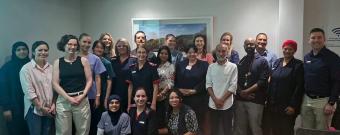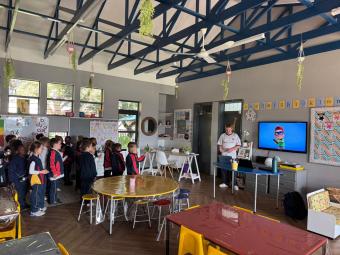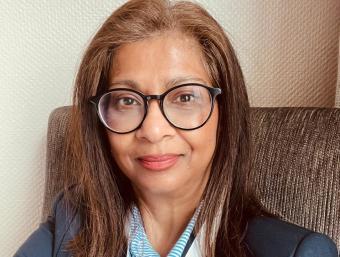Please tell us how and where you grew up, and how your family life and early education shaped your career decisions, lifestyle and personal values.
I grew up in the nice countryside of central Italy, far from the chaos of a big city. It was a place where family ties were paramount. I had the opportunity to have from my childhood a deep connection to nature and was taught to enjoy simple things. My father was a general physician and my mother a teacher. My childhood was deeply influenced by the stories of my grandparents, who endured the hardships of World War II, witnessing the devastation of our city firsthand. These early experiences instilled in me the value of resilience and the importance of cherishing every moment. I am also full of a deep sense of recognition and appreciation for what life brought to me.
Has your life been touched by stroke?
Stroke has had a profound impact on my family life. When I was in my early twenties, just starting my journey in medicine, my grandmother suffered a subarachnoid hemorrhage, which tragically took her life. Her sudden passing left me devastated and grieving. But stroke had already made its mark on my family. Before my grandmother's passing, my father experienced an intracerebral hemorrhage due to his untreated high blood pressure. Despite the severity of his condition, he made a remarkable recovery. These personal experiences ignited my passion for stroke research and advocacy. They inspired me to dedicate my career to advancing our understanding of stroke prevention, treatment, and rehabilitation. My goal is to spare other families from the pain and loss that mine has endured.
Could you please share an anecdote about a patient or case that left a lasting impression?
One patient’s story that really sticks with me is that of a young woman who had recently become a mother to a baby girl. It was supposed to be a beautiful day, enjoying the sunshine and snow in the mountains around l’Aquila. But tragedy struck. She had a stroke while holding her newborn in her arms. The stroke, caused by carotid dissection, not only left her severely disabled in her movements but also changed her personality and behavior. The stark difference between the joy of motherhood and the devastation of stroke in that moment really hit me hard. Seeing the sudden and deep impact of stroke on this lively young mother and her family filled me with profound sadness. It was a powerful reminder of how stroke can completely upend lives in an instant, no matter the age or circumstances.
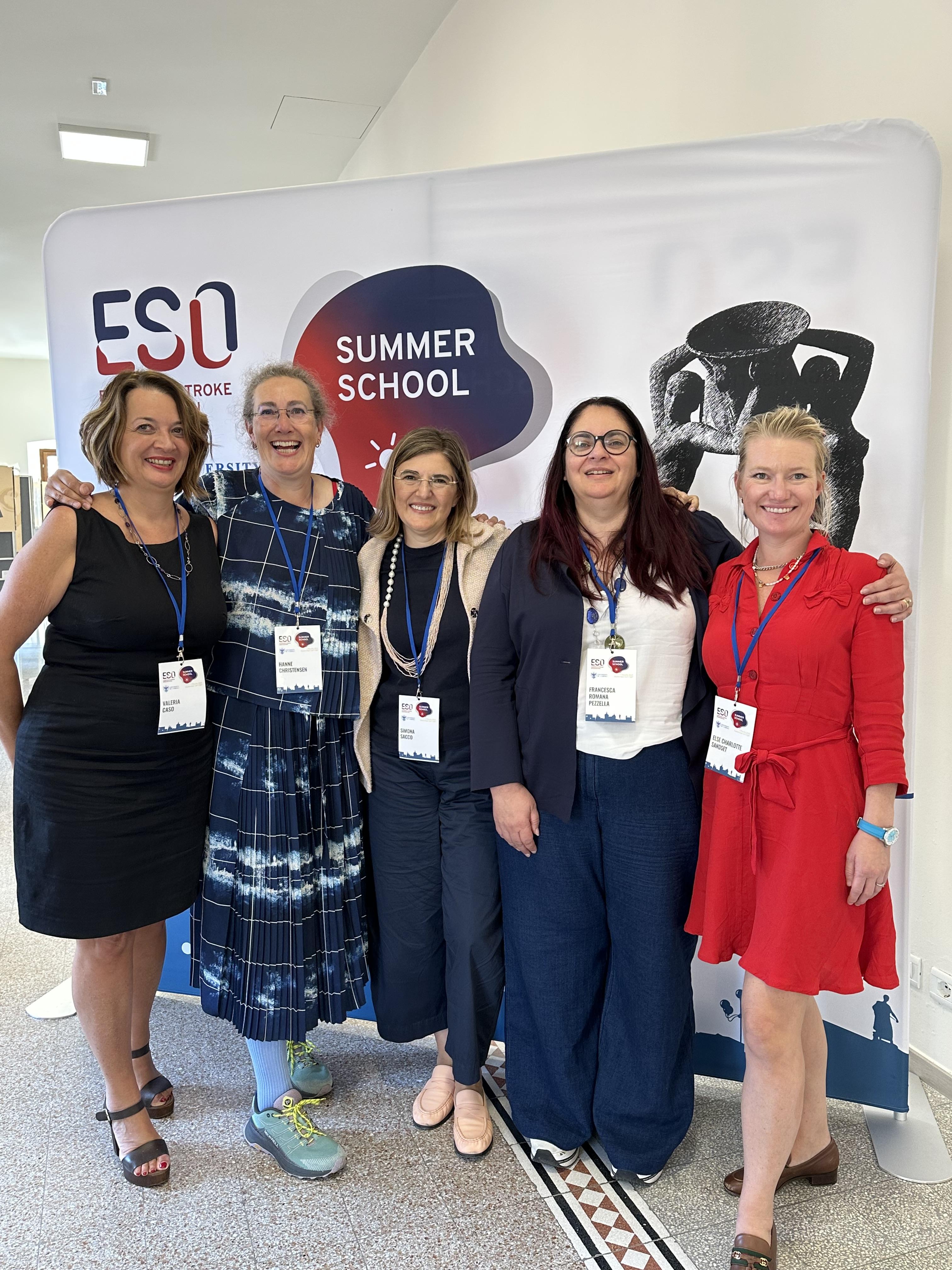
Who and what inspires you? Have there been mentors in your career, and how does being a mentor yourself enrich your own experience.
For me, inspiration comes from believing in the potential for self-improvement and for making a positive difference in my workplace and in the lives of co-workers, students, fellows, and patients, step by step. I’ve learned that growth and change take time, patience, and persistence. It’s a journey of building and embracing opportunities, of ups and downs, marked by victories and setbacks. Persistence and determination make the real difference.
Throughout my career, I’ve been fortunate to have mentors who have played crucial roles in my professional development. Professor Antonio Carolei was my formal mentor in stroke, teaching me the importance of precision, excellence, and perseverance. He introduced me to the field and shared invaluable knowledge with me. I’ve been fortunate to meet exceptional individuals in my career, each with their own values and strengths. I observe and learn from them, incorporating qualities I admire into my own approach. This journey of self-improvement is ongoing, and I greatly value the opportunity to work in an international context where I can meet leaders in science.
Mentoring is a privilege that I deeply appreciate. I find fulfillment in guiding and supporting young colleagues in their professional growth. Effective mentoring involves more than just sharing knowledge; it requires understanding and respecting each mentee’s individuality and supporting them to embrace positively their potential. I believe in providing gentle guidance, creating a trusting and supportive environment. Encouraging mentees to step out of their comfort zones, embrace challenges, and believe in themselves is crucial for their development. I also lead and mentor by example, believing that actions speak louder than words. Consistently demonstrating values and principles inspires and empowers those around me. However, I recognize that mentoring can sometimes lead to disappointment and reveal failures, serving as reminders of the complexities of human behavior.
Improving stroke care standards in low- and middle-income countries has been identified as a priority by both Dr Jeyarah Pandian of the WSO and yourself. What measures would be game changers in the pursuit of inclusivity and equal access?
I'm well aware that both the European Stroke Organisation (ESO) and the World Stroke Organization (WSO) share a common goal of improving stroke care standards, particularly in low- and middle-income countries. Collaboration between these organizations is vital in addressing the urgent need for inclusivity and equal access to stroke care worldwide.
While the WSO takes a global approach, reaching regions where stroke care is limited or absent, the ESO focuses more on Europe. Recognizing the distinct challenges in each region, it’s crucial to tailor our own strategies accordingly.
For the ESO, our Stroke Action Plan for Europe (SAP-E) and the ESO-EAST initiative serve as guides for driving meaningful change within Europe. SAP-E outlines specific measures and goals to enhance stroke care standards across European countries. We’re actively updating and refining this plan to ensure its relevance and effectiveness in addressing evolving challenges.
A critical part of our approach is to encourage more countries, especially those in Eastern and Southern Europe, to sign the SAP-E declaration and commit to implementing tangible actions outlined in SAP-E. By expanding this initiative’s reach and fostering greater participation, we can create a united front against stroke, driving positive change and improving patient outcomes.
Additionally, we must prioritize efforts to address systemic barriers and disparities that hinder access to stroke care, particularly in underserved communities. This may involve advocating for increased funding, capacity-building through training programs, and leveraging technology to enhance remote access to care.
Through collaborative efforts with WSO and leveraging the specific areas of reach of both organizations, we can truly make a difference in the lives of stroke patients worldwide. Together, we’re committed to realizing our shared vision of a world where everyone has equal access to high-quality stroke care, regardless of geographical location or socioeconomic status.
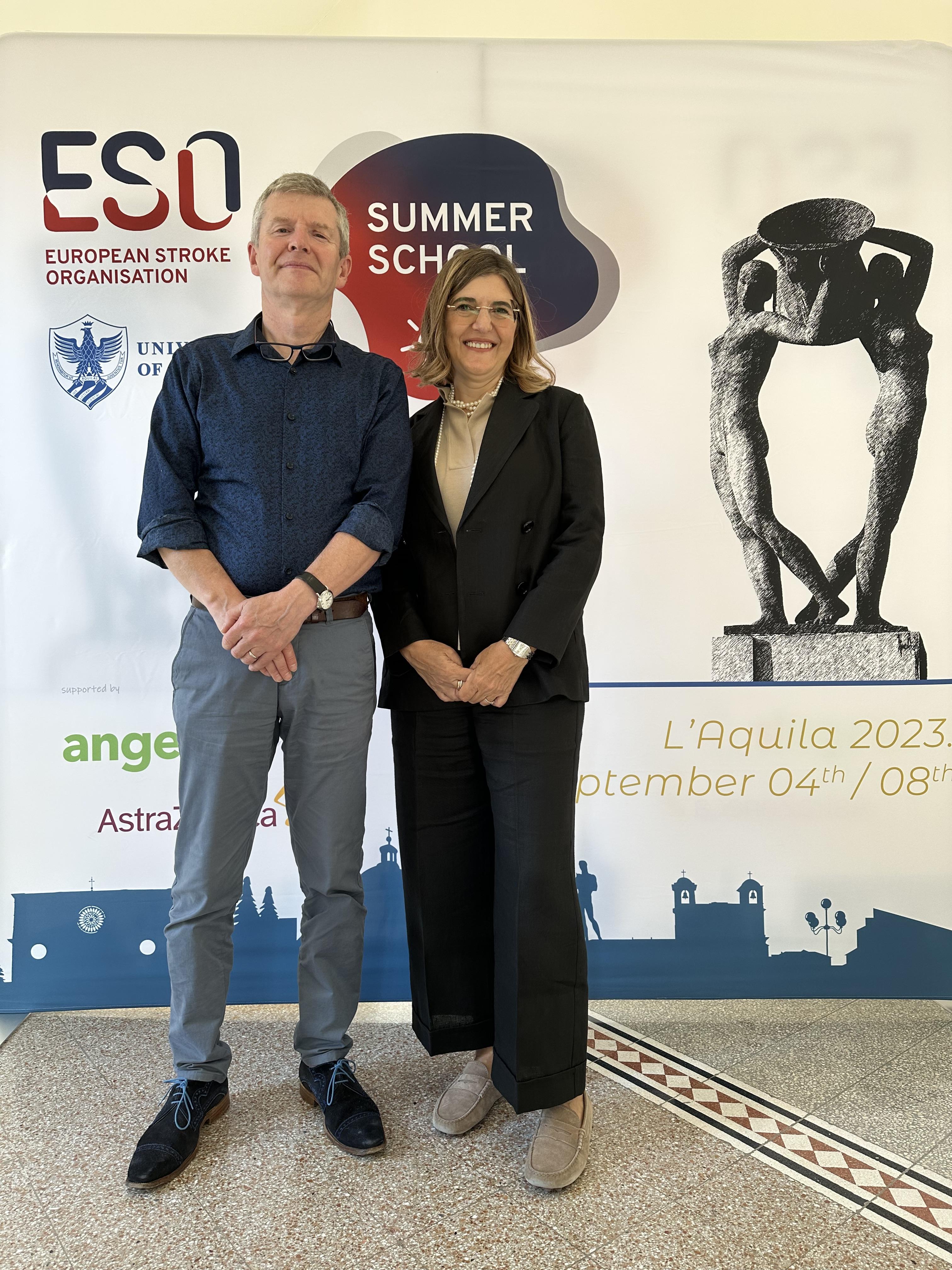
What are currently the most exciting, important or most promising developments in stroke research?
In stroke research, there are several exciting developments that hold great promise for improving outcomes and advancing our understanding of this complex condition. As an advocate for funding in stroke research, I’m particularly passionate about supporting initiatives that address critical areas of need, including:
- Intracerebral Hemorrhage (ICH) Treatment: while significant progress has been made in ischemic stroke management, treatment options for ICH remain limited. There is an urgent need to develop strategies that not only prevent ICH but also offer effective treatment options for those affected.
- Personalized Stroke Prevention: tailoring stroke prevention strategies to individual genetic, epigenetic, and environmental factors represents a promising avenue for reducing stroke incidence. By developing targeted preventive measures based on personalized risk profiles, we can enhance the effectiveness of stroke prevention efforts.
- Cerebrovascular Disease and Dementia: the link between cerebrovascular disease and dementia is increasingly recognized as a significant contributor to cognitive impairment, particularly in aging populations. There is a pressing need for clinical trials and interventions aimed at preventing the progression of cognitive decline by targeting vascular mechanisms.
- Stroke Rehabilitation: despite advancements in stroke rehabilitation, there is still much to be done in understanding and harnessing the potential for neural regeneration and functional recovery. There is an urgent need to explore innovative approaches to rehabilitation that can facilitate the regeneration of neural circuits and improve long-term outcomes for stroke survivors.
The goal of Angels’ new strategy – 100 ANGELS REGIONS – is identifying regions where the public is able to identify stroke symptoms and knows what to do; the EMS provides appropriate care and transport to a stroke-ready hospital; and there are enough stroke-ready hospitals offering the highest standard of acute care. What is necessary to make this strategy succeed and what relevance does it have for your vision for your presidency?
This strategy has the potential to have profound impact by addressing the crucial need for a cohesive system of care. While individual hospital stroke teams may excel, their effectiveness is maximized within an integrated framework. Thus, the focus of this initiative on systemic coordination is pivotal for advancing stroke care.
To ensure the success of this strategy, several key elements are essential. Firstly, the presence of a dedicated local stroke leader is crucial. Additionally, support and guidance from the Angels team, coupled with active engagement of local governance, are needed for effecting substantial change.
Reflecting on my own region, while strides have been made in acute stroke care, achieving gold status necessitates further refinement of our stroke network. Strengthening the collaboration with EMS, inter-hospital coordination and ensuring all patients are promptly referred to stroke-capable centers are paramount. Furthermore, extending treatment options beyond conventional time-based windows and optimizing referral protocols are areas warranting attention.
As ESO president I am committed to collaborating closely with the Angels team to implement this transformative strategy. I think that a close collaboration may be key to propel European stroke care to unprecedented heights. I firmly believe that this initiative has the potential to redefine standards of care and improve outcomes for stroke patients across the continent and I am very pleased that it will start and accompany my presidency.
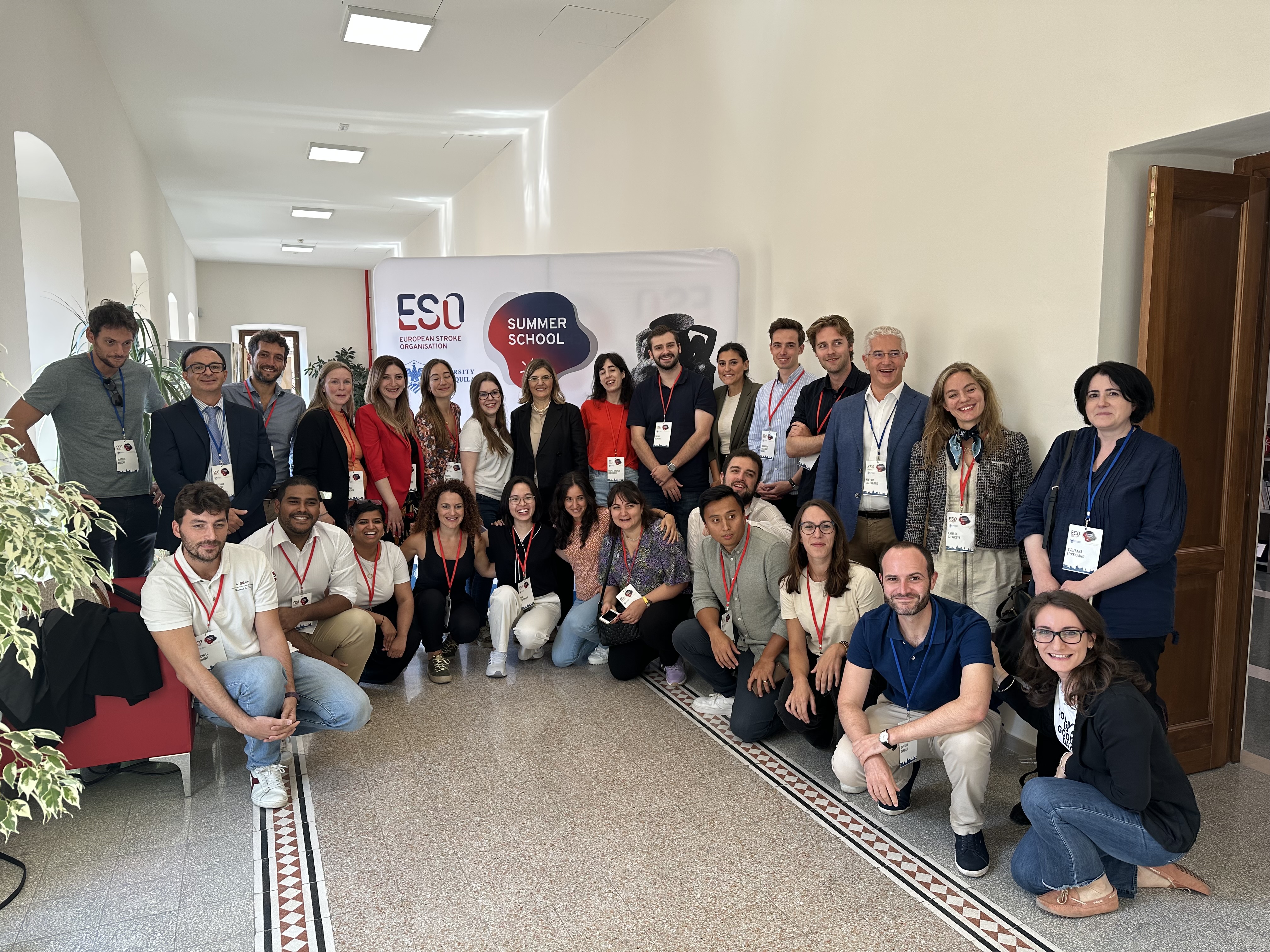
You were a young neurologist attending the ESO stroke summer school in Krems 20 years ago. Last September you hosted the summer school in L’Aquila. How has the world of stroke care and research changed over these two decades?
It was my great pleasure to host the ESO Stroke Summer School in L’Aquila. It was an enriching experience also for me. There were several important lectures covering advances in stroke diagnosis and treatment. Interactive case reports lead by young faculty members put the contents of the lectures into practical perspective. Over these two decades there has been a massive change in the stroke area. We passed from lack of treatment to a treatable disease, we recognized that stroke can be prevented, and we are now moving into the era of focusing more on post-acute treatment.
In March 2024, Angels launched Angels Insights Month which will be a twice-yearly activation of quality monitoring in stroke care. The idea grew out of the success of MonitorISA in Italy. Why is this approach so successful and what impact do you expect Insights Month to have on data-driven quality improvement?
The launch of Angels Insights Month represents an additional step toward driving tangible enhancements in stroke care delivery across Europe. As seen with the success of MonitorISA in Italy, this initiative offers physicians, healthcare providers, and stakeholders regular opportunities to assess performance and benchmark against peers. This cyclical process fosters a culture of continuous improvement, wherein lessons learned from each iteration inform iterative refinements, leading to sustained advancements in care delivery. By leveraging real-time insights and analytics, healthcare providers can identify areas of strength and opportunities for improvement.
At the European level, Insights Month has the potential to foster cross-border collaboration and knowledge exchange as participating countries share best practices and lessons learned.
I expect to witness measurable enhancements in key performance indicators, such as time metrics and outcome measures. It would be also interesting and nice to measure and monitor healthcare providers’ satisfaction scores.
To maximize the impact of this initiative, it will be crucial to organize events aimed at sharing and discussing performance data. Engaging with stakeholders, patient organizations, and policymakers will further amplify the initiative’s reach and effectiveness.
What do you intend to bring to the ESO presidency that is unique and distinct from your predecessors? In what respects will the organisation be different at the conclusion of your presidency?
ESO is a robust and well-structured organization with several flagship programs and numerous collateral activities. It boasts a strong cultural identity and a solid organizational framework, thanks to the contributions and vision of many individuals who have served in various capacities within the society. Therefore, significant changes are not necessary as everything is already in good shape.
During my presidency, I aim to pursue several objectives.
I will embrace actively all the ongoing strategies aimed at improving stroke care in Europe – the SAP-E, ESO-EAST, and Angels. There are already several well-established initiatives that need only to be nurtured.
I intend to enhance the democratic nature of the society and attract a more diverse range of individuals to participate in its activities. While scientific merit remains essential for progress within the society, it’s crucial to recognize the value of diverse perspectives and foster a collaborative and inclusive community.
Additionally, I aim to encourage more young people to enter the field of stroke research and medicine. I will work to develop initiatives aimed at attracting young physicians to this area of healthcare.
Furthermore, I am committed to strengthening our already positive relationships with neurointerventionalists and with those involved in neurorehabilitation and involving them more actively in the society’s activities.
Lastly, it is important to me to support the ESO journal, the European Stroke Journal, in becoming the premier reference journal in the stroke field worldwide.
What are you most afraid of?
What I fear most is anything that threatens the tranquility and well-being of my loved ones and our world. My happiness is deeply tied to the basic needs and health of my family. The thought of wars, natural disasters, or any disruption to our peaceful life worries me greatly. Additionally, I'm concerned about the state of our planet and the environmental challenges we’re up against. The rapid degradation of our environment and the looming threat of climate change weigh heavily on me. I fear that greed and the relentless pursuit of profit may hinder our efforts to address these urgent issues.
What gives you joy?
What brings me the greatest joy are the simple pleasures and moments of tranquility that are part of everyday life: spending time with family, relaxing, enjoying the beauty of nature, and going for a walk or run in the early morning with uplifting music, as well as meeting friends.
Moreover, achieving a long-awaited and hard-earned goal is a source of joy and satisfaction for me. The culmination of a lot of time dedicated to perseverance, coupled with the realization of dreams and aspirations, brings forth a profound sense of accomplishment and fulfillment.
Equally gratifying is the act of planning and dreaming about the future. Envisioning new horizons and possibilities gives a sense of optimism and hope within me. The anticipation of what lies ahead, along with the excitement of embarking on new adventures and endeavors, adds an extra layer of excitement to life’s journey.
